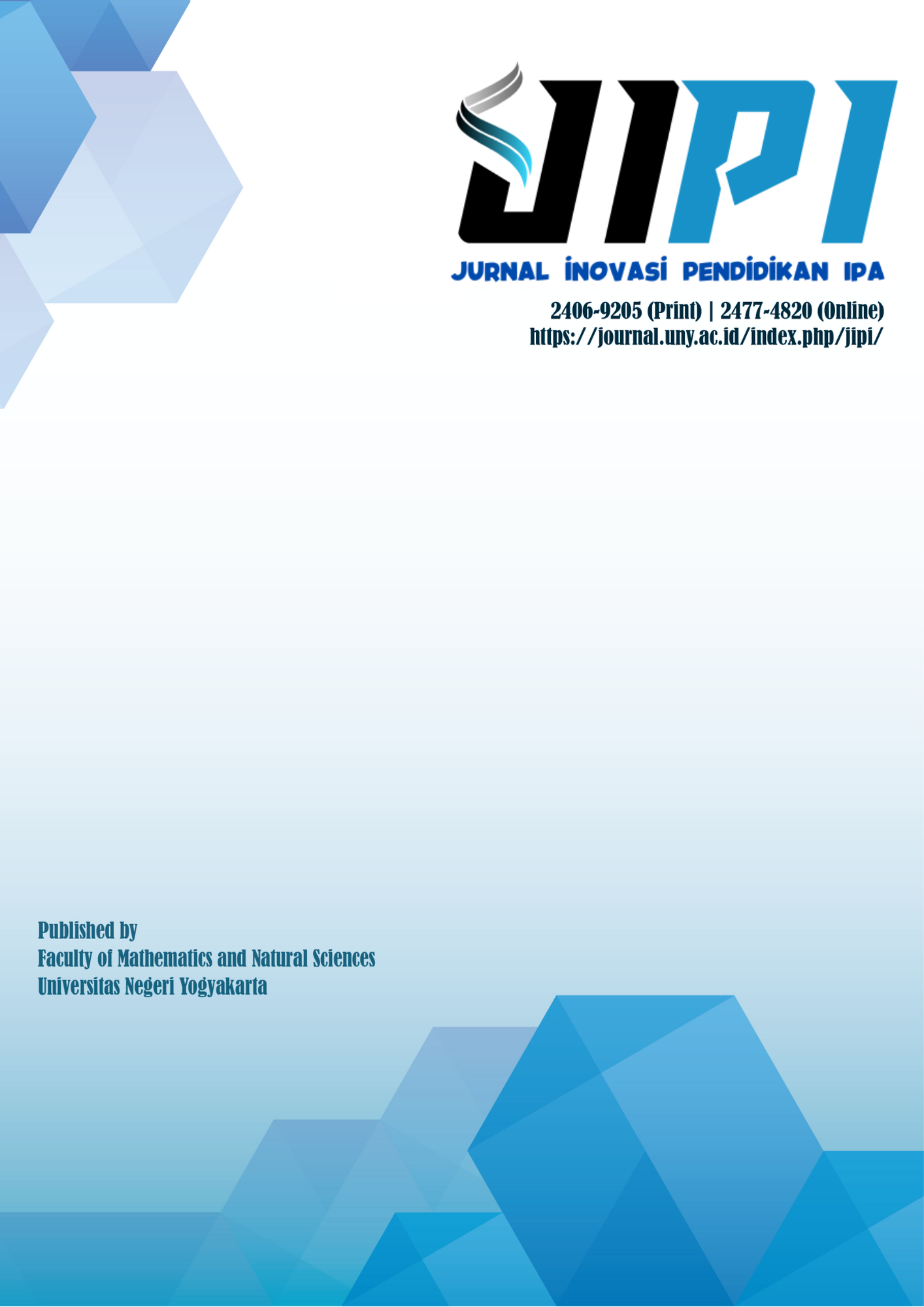Video project in distance learning during the pandemic: Readiness, processes, and benefits
DOI:
https://doi.org/10.21831/jipi.v8i2.45285Keywords:
Creative Thinking, Distance Learning, Project-Based Learning (PjBL), Video ProjectAbstract
References
Afriana, J., Permanasari, A., & Any, F. (2016). 2016 Penerapan project based learning terintegrasi STEM untuk meningkatkan literasi sains siswa ditinjau dari gender. Jurnal Inovasi Pendidikan IPA, 2(2), 202–212. http://dx.doi.org/10.21831/jipi.v2i1.8561
Aji, R. H. S. (2020). Dampak Covid-19 pada Pendidikan di Indonesia: Sekolah, Keterampilan, dan Proses Pembelajaran. SALAM: Jurnal Sosial Dan Budaya Syar-I, 7(5). https://doi.org/10.15408/sjsbs.v7i5.15314
Albar, S. B., & Southcott, J. E. (2021). Problem and project-based learning through an investigation lesson: Significant gains in creative thinking behavior within the Australian foundation (preparatory) classroom. Thinking Skills and Creativity, 41(May). https://doi.org/10.1016/j.tsc.2021.100853
Barrett, T. J., Stull, A. T., Hsu, T. M., & Hegarty, M. (2015). Constrained interactivity for relating multiple representations in science: When virtual is better than real. Computers and Education, 81, 69–81. https://doi.org/10.1016/j.compedu.2014.09.009
Boldt, G. (2019). Artistic creativity beyond divergent thinking: Analysing sequences in creative subprocesses. Thinking Skills and Creativity, 34(November). https://doi.org/10.1016/j.tsc.2019.100606
Brundiers, K., & Wiek, A. (2013). Do we teach what we preach? An international comparison of the problem- and project-based learning courses in sustainability. Sustainability (Switzerland), 5(4), 1725–1746. https://doi.org/10.3390/su5041725
Davenport, J. L., Rafferty, A. N., & Yaron, D. J. (2018). Whether and How Authentic Contexts Using a Virtual Chemistry Lab Support Learning. Journal of Chemical Education, 95(8), 1250–1259. https://doi.org/10.1021/acs.jchemed.8b00048
Demir, E., & Demir, C. G. (2021). Investigation of Parents' Opinions About Distance Education During The COVID-19 Pandemic. Turkish Online Journal of Distance Education, 22(2), 42–57. https://doi.org/10.17718/tojde.906485
Guo, P., Saab, N., Post, L. S., & Admiraal, W. (2020). A review of project-based learning in higher education: Student outcomes and measures. International Journal of Educational Research, 102(May). https://doi.org/10.1016/j.ijer.2020.101586
Hernáiz-Pérez, M., ílvarez-Hornos, J., Badia, J. D., Giménez, J. B., Robles, í., Ruano, V., & San-Valero, P. (2021). Contextualized project-based learning for training chemical engineers in graphic expression. Education for Chemical Engineers, 34, 57–67. https://doi.org/10.1016/j.ece.2020.11.003
Kim, K. H. (2011). The Creativity Crisis: The Decrease in Creative Thinking Scores on the Torrance Tests of Creative Thinking. Creativity Research Journal, 23(4), 285–295. https://doi.org/10.1080/10400419.2011.627805
Lichter, J. (2012). Using YouTube as a platform for teaching and learning solubility rules. Journal of Chemical Education, 89(9), 1133–1137. https://doi.org/10.1021/ed200531j
Lin, H.-M., Chen, W.-J., & Nien, S.-F. (2014). The Study of Achievement and Motivation by e-Learning–A Case Study. International Journal of Information and Education Technology, 4(5), 421–425. https://doi.org/10.7763/ijiet.2014.v4.442
Maqableh, M., & Alia, M. (2021). Evaluation online learning of undergraduate students under lockdown amidst COVID-19 Pandemic: The online learning experience and students' satisfaction. Children and Youth Services Review, 128(January). https://doi.org/10.1016/j.childyouth.2021.106160
Marike, M., & Djukri. (2016). Pengaruh model PBT terhadap kemampuan berpikir kritis dan kemampuan berpikir kreatif siswa SMAN 2 Magelang. Jurnal Inovasi Pendidikan IPA, 2(1), 58–65. http://dx.doi.org/10.21831/jipi.v2i1.8809
Oludare Jethro, O., Moradeke Grace, A., & Kolawole Thomas, A. (2012). E-Learning and Its Effects on Teaching and Learning in a Global Age. International Journal of Academic Research in Business and Social Sciences, 2(1), 2222–6990.
Orlov, G., McKee, D., Berry, J., Boyle, A., DiCiccio, T., Ransom, T., Rees-Jones, A., & Stoye, J. (2021). Learning during the COVID-19 pandemic: It is not who you teach, but how you teach. Economics Letters, 202. https://doi.org/10.1016/j.econlet.2021.109812
Perry, A., & Karpova, E. (2017). Efficacy of teaching creative thinking skills: A comparison of multiple creativity assessments. Thinking Skills and Creativity, 24, 118–126. https://doi.org/10.1016/j.tsc.2017.02.017
Rakhman, K. A., Saraha, A. R., & Sugrah, N. (2017). Pengembangan video penggunaan alat gelas laboratorium kimia di universitas. Jurnal Inovasi Pendidikan IPA, 3(2), 161. https://doi.org/10.21831/jipi.v3i2.15667
Ralph. (2015). Post secondary project-based learning in science, technology, engineering and mathematics. Journal of Technology and Science Education, 5(3), 184–193.
Reis, A. C. B., Barbalho, S. C. M., & Zanette, A. C. D. (2017). A bibliometric and classification study of Project-based Learning in Engineering Education. Production, 27(Special Issue), 1–16. https://doi.org/10.1590/0103-6513.225816
Saha, A., Dutta, A., & Sifat, R. I. (2021). The mental impact of digital divide due to COVID-19 pandemic induced emergency online learning at undergraduate level: Evidence from undergraduate students from Dhaka City. Journal of Affective Disorders, 294(February), 170–179. https://doi.org/10.1016/j.jad.2021.07.045
Selvaraj, A., Radhin, V., KA, N., Benson, N., & Mathew, A. J. (2021). Effect of pandemic based online education on teaching and learning system. International Journal of Educational Development, 85(April). https://doi.org/10.1016/j.ijedudev.2021.102444
Smith, D. K. (2014). iTube, YouTube, WeTube: Social Media Videos in Chemistry Education and Outreach. Journal of Chemical Education, 91(10), 1594–1599. https://doi.org/10.1021/ed400715s
Sumardi, S., & Nugrahani, D. (2021). Adaptation To Emergency Remote Teaching: Pedagogical Strategy For Pre-Service Language Teachers Amid COVID-19 Pandemic. Turkish Online Journal of Distance Education, 22(2), 81–93. https://doi.org/10.17718/tojde.906553
Winkelmann, K., Keeney-Kennicutt, W., Fowler, D., & Macik, M. (2017). Development, Implementation, and Assessment of General Chemistry Lab Experiments Performed in the Virtual World of Second Life. Journal of Chemical Education, 94(7), 849–858. https://doi.org/10.1021/acs.jchemed.6b00733
Downloads
Published
How to Cite
Issue
Section
Citation Check
License
The authors submitting a manuscript to this journal agree that, if accepted for publication, copyright publishing of the submission shall be assigned to Jurnal Inovasi Pendidikan IPA (JIPI). However, even though the journal asks for a copyright transfer, the authors retain (or are granted back) significant scholarly rights.
Jurnal Inovasi Pendidikan IPA by http://journal.uny.ac.id/index.php/jipi/index is licensed under a Creative Commons Attribution-ShareAlike 4.0 International License.










